Macro-Finance Salon (No. 40): Trend and International Status of RMB
2016-11-03 IMI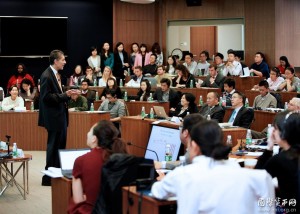 On November 3, Macro-Finance Salon No. 40 was jointly held by IMI, Brookings Institution-Tsinghua University and Penn-Wharton China Center. Eswar Prasad, a senior researcher at the Brookings Institution, former China director of IMF, and professor of Cornell University, made a keynote speech on the trend and international status of RMB.Prof. Ben Shenglin, founder of executive director of IMI, Prof. Tsai Wan-Tsai and Prof. Marshall W. Meyer from Wharton School at the University of Pennsylvania participated in the discussion. This salon was chaired by Guan Xin, the anchor of CCTV-NEWS.
On November 3, Macro-Finance Salon No. 40 was jointly held by IMI, Brookings Institution-Tsinghua University and Penn-Wharton China Center. Eswar Prasad, a senior researcher at the Brookings Institution, former China director of IMF, and professor of Cornell University, made a keynote speech on the trend and international status of RMB.Prof. Ben Shenglin, founder of executive director of IMI, Prof. Tsai Wan-Tsai and Prof. Marshall W. Meyer from Wharton School at the University of Pennsylvania participated in the discussion. This salon was chaired by Guan Xin, the anchor of CCTV-NEWS.
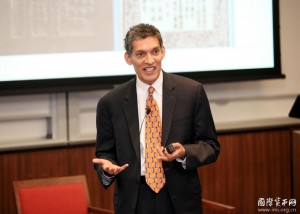 Eswar Prasad introduced the rise of RMB, the development of international monetary system, the development of China’s economy and the the role of RMB’s internationalization in China’s economic reform, specifically, capital account liberalization, floating exchange rate, the procedure of developing a mature financial market, balance of risk and return in economic transition, benefits and potential risks of capital account liberalization, and the requirement of China’s financial reform in the internationalization of RMB.
Eswar Prasad introduced the rise of RMB, the development of international monetary system, the development of China’s economy and the the role of RMB’s internationalization in China’s economic reform, specifically, capital account liberalization, floating exchange rate, the procedure of developing a mature financial market, balance of risk and return in economic transition, benefits and potential risks of capital account liberalization, and the requirement of China’s financial reform in the internationalization of RMB.
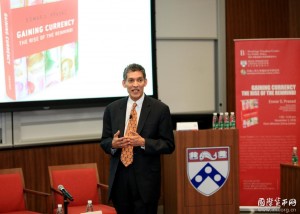 In regard to capital account liberalization, he pointed out, although China has a large amount of savings, it’s still beneficial for China to liberalize the capital account to absorb foreign investment because it contributes to promoting diversification of domestic investment and introducing the advanced technology and managerial experiences of enterprises. Regarding the reform of China’s financial market, he suggested that the advantage of being a creditor country should be fully exploited and foreign exchange balance sheet must be balanced in order to internationalize RMB. Concerning the trend of RMB’s exchange rate, he made it clear that along with the ubiquitous usage of RMB in foreign trade settlement, the amount of RMB-denominated bonds has been increasing, showing that the share of RMB in global settlement is growing and RMB gradually plays a more important role in global payment. As RMB became one of the reserve currencies, China’s financial market needs to improve its liquidity, reinforce the establishment of financial infrastructure, diversify financial products and instruments, improve supervision mechanism and transaction environment. Challenges are waiting for the internationalization of RMB. About the stability of China economy, he considered that there are many risks. RMB may play a more important role in the next three to five years. However, considering the unsolved internal policy issues, the internationalization of RMB may have its twists and turns.
In regard to capital account liberalization, he pointed out, although China has a large amount of savings, it’s still beneficial for China to liberalize the capital account to absorb foreign investment because it contributes to promoting diversification of domestic investment and introducing the advanced technology and managerial experiences of enterprises. Regarding the reform of China’s financial market, he suggested that the advantage of being a creditor country should be fully exploited and foreign exchange balance sheet must be balanced in order to internationalize RMB. Concerning the trend of RMB’s exchange rate, he made it clear that along with the ubiquitous usage of RMB in foreign trade settlement, the amount of RMB-denominated bonds has been increasing, showing that the share of RMB in global settlement is growing and RMB gradually plays a more important role in global payment. As RMB became one of the reserve currencies, China’s financial market needs to improve its liquidity, reinforce the establishment of financial infrastructure, diversify financial products and instruments, improve supervision mechanism and transaction environment. Challenges are waiting for the internationalization of RMB. About the stability of China economy, he considered that there are many risks. RMB may play a more important role in the next three to five years. However, considering the unsolved internal policy issues, the internationalization of RMB may have its twists and turns.
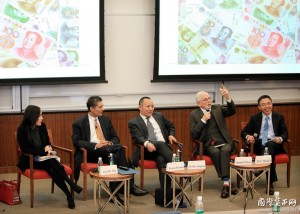 During the discussion session, the panelists discussed how to make RMB an authentic international currency and whether the “One Belt and One Road” Initiative can promote the internationalization of RMB”.
During the discussion session, the panelists discussed how to make RMB an authentic international currency and whether the “One Belt and One Road” Initiative can promote the internationalization of RMB”.
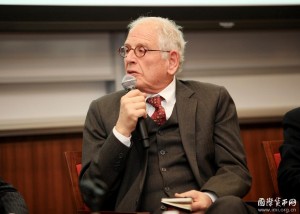 Marshall W. Meyer raised questions regarding Eswar Prasad’s speech, including: Is signing swap agreement really helpful to Chinese economy? What will China do to deal with the bubbles and capital flight? How can China take full advantage of reserve currency? Are banks in China willing to reform thoroughly? From his point of view, China’s oversea investment already surpassed the FDI. Massive China enterprises investment in foreign country will lead to more RMB settlement, therefore, promoting RMB internationalization. Meanwhile, he pointed out that liberalization of capital account may have negative impact on China economy’s stability.
Marshall W. Meyer raised questions regarding Eswar Prasad’s speech, including: Is signing swap agreement really helpful to Chinese economy? What will China do to deal with the bubbles and capital flight? How can China take full advantage of reserve currency? Are banks in China willing to reform thoroughly? From his point of view, China’s oversea investment already surpassed the FDI. Massive China enterprises investment in foreign country will lead to more RMB settlement, therefore, promoting RMB internationalization. Meanwhile, he pointed out that liberalization of capital account may have negative impact on China economy’s stability.
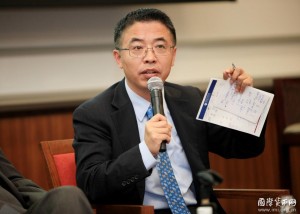 Ben Shenglin held that exchange rate is not only an economic problem for the political and military factors weight as well. The most urgent thing for China to do is to make RMB an asset currency. Now, China hasn’t completely liberalized capital account and RMB’s exchange rate is not fully flexible. Promoting China’s trade capacity is the most important goal under the background that China’s capital market falls behind the US and the size of derivative market is too small. The international position of RMB is actually decided by the strength of China’s financial market and the quality of financial institutions.
Ben Shenglin held that exchange rate is not only an economic problem for the political and military factors weight as well. The most urgent thing for China to do is to make RMB an asset currency. Now, China hasn’t completely liberalized capital account and RMB’s exchange rate is not fully flexible. Promoting China’s trade capacity is the most important goal under the background that China’s capital market falls behind the US and the size of derivative market is too small. The international position of RMB is actually decided by the strength of China’s financial market and the quality of financial institutions.
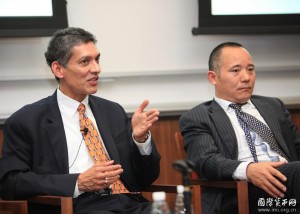 Eswar Prasad expressed his view on the proper measures for China government to balance the risk and impel financial reform. He put forward that the contribution of exchange rate and the capital account liberalization to the development of China’s capital market depends on the works done by decision makers and government officials who manage and supervise the financial market. He believed that flexible exchange rate policy can play a better role in buffering the emerging market. He indicated that for all the countries, increasing domestic demand through currency depreciation (as lots of countries did) is no more helpful than promoting economic growth and coordinating on policy making when solving the long-term problem.
Eswar Prasad expressed his view on the proper measures for China government to balance the risk and impel financial reform. He put forward that the contribution of exchange rate and the capital account liberalization to the development of China’s capital market depends on the works done by decision makers and government officials who manage and supervise the financial market. He believed that flexible exchange rate policy can play a better role in buffering the emerging market. He indicated that for all the countries, increasing domestic demand through currency depreciation (as lots of countries did) is no more helpful than promoting economic growth and coordinating on policy making when solving the long-term problem.
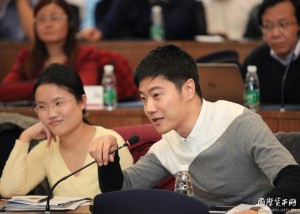 Eswar Prasad answered several questions from the audience regarding the correlation between the US financial crisis and capital account, the importance of economic fundamentals to the rising of RMB, how RMB’s internationalization may influence US economic policy, how the central bank can solve the inflation. He emphasized that the gradual liberalization of China’s capital account deserves adequate intention and violent fluctuation in domestic capital market should be avoided.
Eswar Prasad answered several questions from the audience regarding the correlation between the US financial crisis and capital account, the importance of economic fundamentals to the rising of RMB, how RMB’s internationalization may influence US economic policy, how the central bank can solve the inflation. He emphasized that the gradual liberalization of China’s capital account deserves adequate intention and violent fluctuation in domestic capital market should be avoided.
